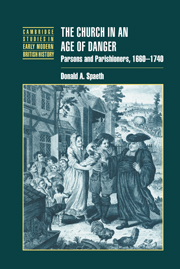Book contents
- Frontmatter
- Contents
- List of tables
- Acknowledgements
- List of abbreviations
- 1 Introduction
- 2 Clerical profiles
- 3 Arenas for conflict
- 4 The management of disputes
- 5 Pastoral care
- 6 Tithes and religious conflict
- 7 The nonconformist threat
- 8 Popular observance
- 9 Matters of life and death
- 10 Singing and religious revival
- 11 Conclusion
- Selected bibliography
- Index
- Cambridge Studies in Early Modern British History
10 - Singing and religious revival
Published online by Cambridge University Press: 28 July 2009
- Frontmatter
- Contents
- List of tables
- Acknowledgements
- List of abbreviations
- 1 Introduction
- 2 Clerical profiles
- 3 Arenas for conflict
- 4 The management of disputes
- 5 Pastoral care
- 6 Tithes and religious conflict
- 7 The nonconformist threat
- 8 Popular observance
- 9 Matters of life and death
- 10 Singing and religious revival
- 11 Conclusion
- Selected bibliography
- Index
- Cambridge Studies in Early Modern British History
Summary
'Tis hardly possible for me to express what a fondness the generality of my People, both old and young, now have for this Divine Ordinance, of Singing Psalms … 'Tis to the great Joy of my Soul, that by this little Labour, and the Blessing of God upon it … I have brought the greater Number of my Congregation to Joyne in the Singing of Psalms.
In 1717 George Millard rejoiced in the success of his efforts to promote psalmody in the parish of Box, near Bath. Inducted into the vicarage in 1707, Millard was to serve the parish for over thirty years. Although he was a pluralist, his other two benefices in Wiltshire were small and did not prevent him from fulfilling his pastoral duties with enthusiasm. After his death in 1740, one of Millard's clerical friends described him as ‘a Clergyman of great Piety, Zeal, Integrity, & Charity’. Although his years as vicar were not entirely free from conflict, he was a model clergyman. In his long incumbency he embarked on a series of religious and social initiatives which did much to reinvigorate worship in Box and nearby parishes. Millard exhibited pastoral qualities not normally attributed to the parish clergy in the years before the evangelical movement and he demonstrated the vitality that the worship of the Church of England was capable of possessing in country parishes.
- Type
- Chapter
- Information
- The Church in an Age of DangerParsons and Parishioners, 1660–1740, pp. 225 - 253Publisher: Cambridge University PressPrint publication year: 2000



